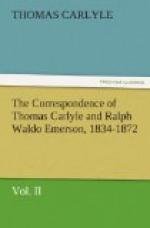---------- * Bossu wrote two books which are known to the student of the history of the settlement of America; one, “Nouveaux Voyages aux Indes occidentales,” Paris, 1768; the other, “Nouveaux Voyages dans l’Amerique septentrionale,” Amsterdam (Paris), 1777. ----------
And poor Miss Fuller, was there any Life ever published of her? or is any competent hand engaged on it? Poor Margaret, I often remember her; and think how she is asleep now under the surges of the sea. Mazzini, as you perhaps know, is with us this summer; comes across once in the week or so, and tells me, or at least my Wife, all his news. The Roman revolution has made a man of him,—quite brightened up ever since;—and the best friend he ever saw, I believe, was that same Quack-President of France, who relieved him while it was still time.
My Brother is in Annandale, working hard over Dante at last; talks of coming up hither shortly; I am myself very ill and miserable in the liver regions; very tough otherwise,—though I have now got spectacles for small print in the twilight. Eheu fugaces,—and yet why Eheu? In fact it is better to be silent.—Adieu, dear Emerson; I expect to get a great deal brisker by and by,—and in the first place to have a Missive from Boston again. My Wife sends you many regards. I am as ever,— affectionately Yours,
—T. Carlyle
CXLV. Emerson to Carlyle
Concord, 28 July, 1851
My Dear Carlyle,—You must always thank me for silence, be it never so long, and must put on it the most generous interpretations. For I am too sure of your genius and goodness, and too glad that they shine steadily for all, to importune you to make assurance sure by a private beam very often. There is very little in this village to be said to you, and, with all my love of your letters, I think it the kind part to defend you from our imbecilities,—my own, and other men’s. Besides, my eyes are bad, and prone to mutiny at any hint of white paper.




